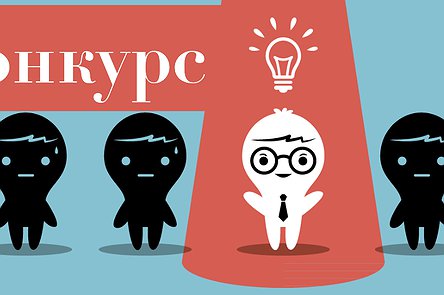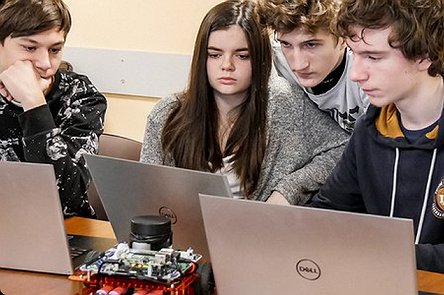THE INTERNATIONAL YOUTH COMPETITION OF SCIENTIFIC, SCIENTIFIC-PRACTICAL AND SCI-FI WORKS "HORIZON-2100"
Acceptance of works for the HORIZON 2100 Competition in 2021 is open!
Our competition is designed for active-minded youngpeople from different countries, who are able to “turn on” their intellect and carry out a creative search for scientific ideas, hypotheses or sci-fi ideas about the distant future at the turn 2100.
Young people from any country, of any nationalities aged 16 to 26 are invited.
IMPORTANT! The time of severe trials and shocks for all mankind, associated with the pandemic and its economic and social consequences, continues. On January 15, 2021, UN Secretary General António Guterres issued a statement: “Our world has crossed another tragic milestone: The Covid-19 pandemic has already claimed two million lives. (at the time of the opening of the competition, according to world statistical agencies, the total number of deaths from coronavirus infection in the world was already 2,551,354 people) Behind this truly staggering number are names and faces: a smile that has become only a memory; forever empty chair at the dinner table; a room in which the silence of a loved one echoes. " "We all have to learn serious lessons from this crisis ... But there is one important fact that is beyond doubt - the world was not ready for this."
For this reason, in 2021, the organizers of the competition will welcome works in which participants will present their solutions aimed at overcoming possible future pandemics and building human resilience to possible future challenges.
The working languages of the Project are Russian and English.
Competition is carried out according to the following profile directions:
Proposal for a new format of the profile directions of the competition
Directions - blocks:
Future of the humankind:
- medicine, pharmacology, biomedical industries, health care, life extension, human physiology, treatment and prevention of diseases, resistance of microbes to antibiotics (how this threatens the person of the future);
- ways of preserving and strengthening the health and working capacity of people, a cyborg man (with mechanical or electronic devices integrated into the body);
- "smart" and growing prostheses, medical exoskeletons;
- legal and ethical aspects of human reproduction (artificial and posthumous reproduction), expanding the possibilities of reproduction in the future, ethical issues of creating an artificial human and medical and biological problems of human birth in space;
- web generations, evolutionarily "slow" people in the information world.
Future of the world:
- International relations, international cooperation, international security, regional conflicts, wars, armed forces and weapons, world culture, world civilizations;
- Geopolitical processes, key world agents and actors - countries, integration associations, transnational corporations;
- e-governments, national threats in the context of global problems, inequality and social divide on a global scale.
- Economic and social aspects of human development, migration, ethnography, demography;
- space exploration, global evolution,
- society, civil society; information society, national digital strategies, society and nanotechnology;
- issues of pandemics in the context of globalization and an increase in the number of inhabitants of the Earth.
Future of science, knowledge management and innovation:
- Natural Sciences:
- Astronomy - its capabilities, the solar system, planets and exoplanets, stars, galaxies, cosmology and evolution of the Universe, the search for extraterrestrial intelligence;
- Physics - optics, plasma physics, structure of matter, physics of various media;
- Chemistry - inorganic, biochemistry, biogeochemistry, geochemistry, agrochemistry, medical chemistry, physical chemistry, thermochemistry, electrochemistry, photochemistry, nuclear chemistry, cryochemistry, plasma chemistry, mechanochemistry, cosmochemistry, chemistry of processing substances, etc.;
- Biology - zoology, botany, physiology of animals, humans and plants, biological chemistry, microbiology, virology (How pandemics can change theoretical and applied virology in the world in the future), molecular biology, molecular genetics, space biology, etc.;
- geography - geology, geography, soil science, anthropology, climatology, etc.
- Technical sciences - architecture, astronautics, shipbuilding, mechanical engineering, materials science (including smart materials, nano- and superstructures), mechanics, systems engineering, electrical engineering, telecommunications, radio electronics, chemical technology, biotechnology, informatics, nuclear power, etc.
- Humanities and social sciences: psychology, anthropology, history, ethnography, linguistics, rhetoric, pedagogy, cultural studies, philology; sociology, economics, political science, social sciences in general, theory and practice of social development, philosophy, sociology, political science, social processes, exchange of scientific information on current social research, state and law, legal sciences, politics and political sciences, adaptive learning systems.
Future of AI, digital environment, bionics, and other key technologies;
- Thinking modeling, hybrid intelligence, intelligent systems, business intelligence, production transformation, biotechnology, cognitive informatics, blockchain technologies, expanding the scope of artificial intelligence, machine learning, deep learning of neural networks.
- - The Internet of Things, perception of information, information society, information sphere, planetary networks, the "dark side" of the digital future.
- Nanotechnology - nano medicine, nanotechnology industry, computational nanotechnology, nano system modeling, nanotechnology market.
Future of the economy, business and financial sphere;
Economic theory, neoclassical economics, behavioral economics, regional economics, government regulation, green economy, business innovation, e-business, trading bots, new business ecosystems, entrepreneurship, finance, behavioral finance, investments, budget, taxes, banks, money evolution, world economy and states, foreign trade, international business, changes in the economy as a result of automation and their impact on society.
Future of the Earth's ecosystem;
Ecology, local and global ecosystems, environmental protection, soil science, anthropogenic system, organizational and legal mechanisms of nature use, management in the field of nature management and environmental protection, public environmental relations, the impact of industries on the environment, space debris, resource development, climate change, global biodiversity crisis.
Future of energetics:
renewable energy sources, non-traditional energy sources, electrical networks, energy saving, heat supply, energy systems, energy and diplomacy, energy and security, development of alternative energy
Future of human life:
Agro complex and rural development; urbanism - infrastructure of the city of the future, mobility, transport and infrastructure, health, insurance, social infrastructure, education, professions, employment, recreation, family, quality of life, spheres of life and development, living standards, self-realization, information wealth and information poverty, socio-political structure and structure of society, mankind's strategies for the development of interstellar space and space resources, the development of space civilization, human expansion into space and other planets, space settlements, extraterrestrial civilizations.
Within each direction, the competition is held in two nominations:
|
❖ For the best scientific article, research, scientific-practical work, reflecting the scientific vision of the future of the planet and humanity at the turn of 2100 and the prospects for the development of various scenarios,
|
❖ For the best Sci-fi work - sci-fi story, essay, reportage, journalism, etc. describing imaginary innovative and original ideas, fantastic events, phenomena, processes and future prospects at the turn of the year 2100, giving them a scientific explanation,
|
and also offering the best solutions aimed at:
- reducing the vulnerability of humanity in the face of future pandemics;
- creation of prerequisites and mechanisms in any spheres for the development and strengthening of mankind's resilience to possible future challenges;
- the formation of a future in which the authors of the works would like to live on their own, and which, in their opinion, will meet the needs of the present and the needs of future generations.
DATE OF THE COMPETITION IN 2021:
- Acceptance of works: March 1 - May 31 (inclusive).
- Examination of works - from June 1 to July 15.
- Summing up the results of the Competition, determining the works-finalists who took the prize I, II, III places and announcing the winners - July 16-20.
- The International Youth Forum "FUTURE IMAGE THAT WE WANT: FORESIGHT 2100", where the winners will be awarded, is scheduled for August 23-26, 2021. However, it is possible to postpone the forum for - September - October. Confirmation of the exact data on the holding of the Forum will be announced after the situation with the opening of borders and the lifting of restrictions related to the COVID-19 pandemic is clarified.
To submit a work for the competition, read the Terms of participation, Directions of the competition - 2021, Recommendations for the design of SCIENTIFIC AND SCIENTIFIC-PRACTICAL WORKS and Recommendations for the design of CREATIVE WORKS, please follow the link: http://www.futurible.space/ru/project/horizon- 2021 /
CONTACT INFORMATION
Registration on the website http://www.futuruble.space
Also follow the news in the official groups on social networks:
VK: https://vk.com/futuriblespace, https://vk.com/public185555977
FB: https://www.facebook.com/futurible.space/,
https://www.facebook.com/groups/587152261775768
For all questions of participation and cooperation in Russian, please contact us at horizon2100@futurible.space
For all questions of participation and cooperation in English, please contact by mail - contest2100@futurible.space
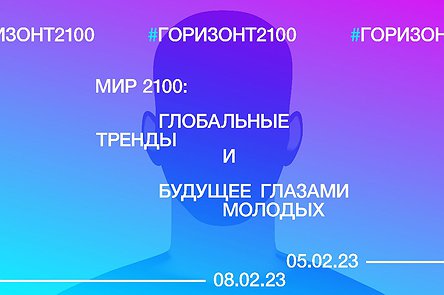
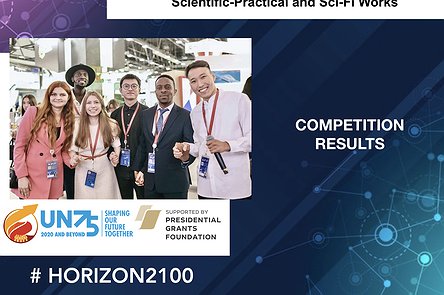
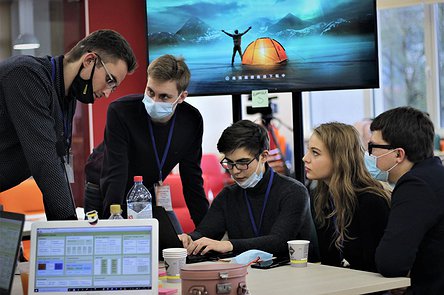
 For any questions in English, please contact by mail -
For any questions in English, please contact by mail - 